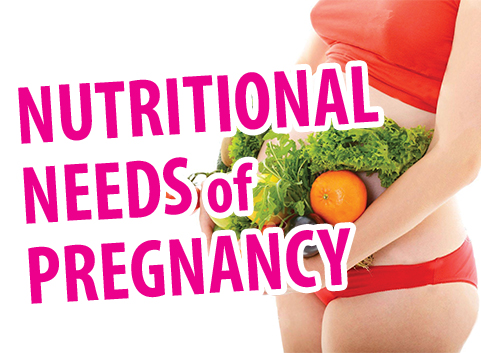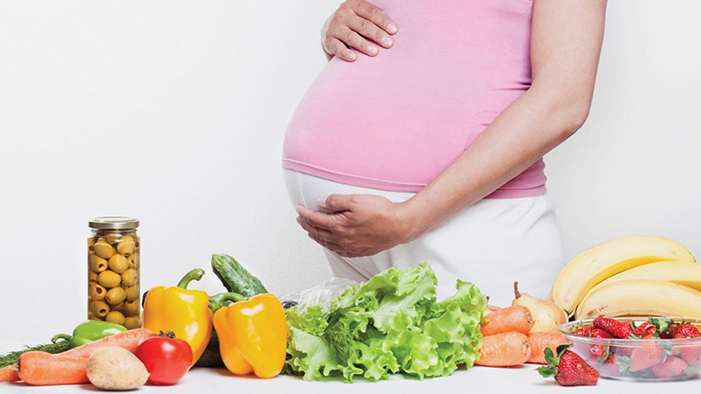Home Diet & Nutrition nutritional needs of pregnancy
Nutritional Needs Of Pregnancy

By Nutan Khimasiya
Mother’s nutritional status and food habits before conception, during pregnancy and after delivery, influences the health of her baby.

Pregnancy is a demanding physiological state, the 9 months between conception and the birth of a baby is a complex period of rapid growth and functional development which require increased energy and nutritional support. A healthy, active, well-fed and non addictive women are in good nutritional state at conception and have a better chance of having a healthy baby, compared with those who are undernourished before conception and remain so throughout gestation.
Following dietary and health guidelines are recommended for the well-being of both the mother and fetus.
1. Before pregnancy, women are encouraged to achieve and maintain a healthy weight. Gradual weight gain (average 10 to 12 kg) during pregnancy is normal and important for the health of both the mother and baby.
2. If prospective mother fails to gain recommended weight, the condition might lead to low birth weight baby and/or premature delivery. However, it is also important not to gain too much weight as it might lead to difficulty in birth, gestational diabetes and other complications.
3. Ideal weight gain for mothers with BMI;
• below 18.5 (underweight) is between 12.5 to 18 kg
• 18.5-25 (normal weight) is between 11.5 to 16 kg
• 25-30 (overweight) is 7 to 11.5 kg
• above 30 (obese category) is between 5 to 9 kg.
4. It is recommended to increase 340 kcal/day during the second trimester and approximately 450 kcal/day during the third trimester of pregnancy.
5. The daily diet of a pregnant mother should contain;
• 0.5 gm of protein during first trimester and 6.9gm during second trimester and 22.7 gm during third trimester of pregnancy. Consume lean meats and poultry, fish, eggs, paneer, tofu, nuts and seeds, legumes and beans. Ensure 8 to 12 ounces of seafood per week from a variety of seafood types lower in methyl mercury and lead contamination.
• Complex carbs including plenty of vegetables of different types and colors, legumes, beans, fruit, grains (cereals) mostly wholegrain high in fibers (around 25 gm/1000 kcal) to avoid constipation.
• Polyunsaturated and monounsaturated fats including vegetable oils, spreads, nut butters/pastes and avocado, avoiding high fat foods predominately saturated fats such as butter, cream, margarine and palm oil.
6. The pregnancy diet should necessarily include;
• Folic acid fortified foods or supplements in addition to food forms of folate which reduce the risk of congenital malformations and increases the infant’s birth weight and is also essential for the synthesis of hemoglobin. Green leafy vegetables, legumes, nuts and liver are good sources of folic acid.
• Vitamin B12 (fortified foods soy or soy milk, fish, poultry, eggs and milk) along with folic acid to help prevent spinal and central nervous system birth defects in fetus.
• Calcium, essential both during pregnancy and lactation, for formation of infant’s bones and teeth, for secretion of breast-milk rich in calcium and to prevent osteoporosis in the mother. Consume adequate amounts of milk, yoghurt, cheese mostly low fat.
• Vitamin D supplementation, vital for calcium absorption and reducing the risk of autism in infants. Eggs and exposure to sunlight are natural sources of Vitamin D.
• Foods sources of heme iron (meat, fish and poultry) which are readily absorbed. When consuming iron rich green leafy vegetables, legumes and dry fruits incorporate source of vitamin C rich citrus fruits, which enhances iron absorption. Iron plays a vital role of carrying oxygen for cell development and is necessary during pregnancy to secure infant’s iron stores.
• Supplementation and food sources of zinc (oysters, chicken, toasted wheat germ, spinach, pumpkin seeds, nuts, beans, mushrooms etc.), as its deficiency might lead to major obstetric complication and congenital malformations in fetus.
• Adequate amount of iodine essential for mental health of infant.
• Iron, folate and calcium supplementation, after 14 to 16 weeks of pregnancy and vitamin B12 daily.
7. Caffeine rich beverages such as tea bind dietary iron making it unavailable for absorption. Hence, should be avoided before during or soon after a meal. Also excess tea and coffee consumption adversely affect the fetal growth.
8. Ensure plenty of fluids intake both from food sources and 8-12 glasses of water per day.
9. Pregnant mother are at greater risk of food poisoning, hence should prepare and store food carefully. Avoid contaminated foods and follow protective measure against food borne illness. Avoid food containing bacteria like soft cheeses (ricotta, feta and blue cheese), sandwich meats, bean sprouts, per-prepared salads and raw eggs.
10. Limit intake of foods high in simple sugar, saturated fat and salt such as biscuits, cakes, pastries, pies, processed meats, commercial burgers, pizza, fried foods, potato chips, crisps and other savory snacks.
11. Should eat regular meals and snacks, avoid fasting and skipping meals especially breakfast. Avoid odors, foods and supplements that triggers nausea.
12. Pregnant mother should undergo periodic health check-up for weight gain, blood pressure, anemia and receive necessary immunization.
13. Pregnant mother should be physically active and should indulge in recommended safe exercise regime with adequate rest for 2-3 hrs during the day.
14. Pregnant mother should not indiscriminately take any drugs without medical advice, as some of them could be harmful to the fetus.
15. When pregnant one should totally abstain from smoking and consumption of alcohol. Smoking should also be avoided by people near pregnant mother.
16. Wrong food beliefs those without scientific evidences should be discouraged.
